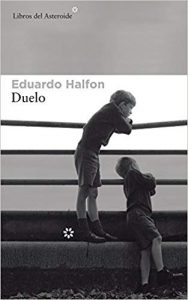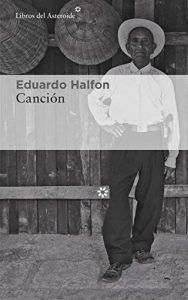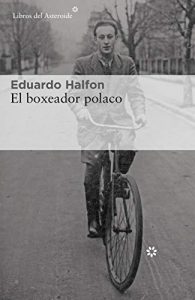It is never easy to pick up the baton. But perhaps it is less to mark the way. Edward Halfon It is the mainstay of a Guatemalan literature that is orphaned by other great current references in fictional narrative. Logically, I do not want to say that there are no interesting writers in Guatemala. But from the most current generation of the 70s onwards, Eduardo is the most visible head.
Furthermore, the determination of writing as a profession comes more from popular transcendence, success, sales in the end that are elevated today and give autonomy to the current writer. And in those there is a Halfon translated into various languages already with a literature drawn from the brevity of some remote story that seems to branch out to a thousand horizons.
In the end, the commitment, the will and the conviction about the quality of his work, make Eduardo Halfon one of those well-seasoned storytellers who know perfectly how to tell the new story of the moment that assails them with the strength of some muses determined that he is the one who testifies to their occurrences.
Witty stories, absolutely and strangely empathetic experiences, brilliant existentialism from the aesthetic form with its resources and tropes to transcend from the simple image to the explosive uproar of ideas. A writer always suggestive in his extensive bibliography who as soon as he tunes in with a reference for him such that Sergio Ramirez, more occupied with the political and the sociological, as he approaches the fiction most typical of his generation.
Top 3 recommended books by Eduardo Halfon
Mourning
The fraternal ties serve as the first reference to the contradictory spirit of the human being. Sibling love is soon interspersed with disputes over identity and egos. Of course, in the long run, the search for that identity ends up intermingling between those who share a direct origin of genes and a possible common home until they reach adulthood.
The mysteries of this personal relationship between mammals of the same breast open the way for a plot between reality and fiction, the one presented in this book.
It is clear that, with this title, we also face the tragedy of loss in the book, but the grief is not only limited to a possible disappearance of the one with whom we share so many years towards maturity. Grief can also be understood as the loss of space, the concession due to the newly arrived brother. Shared love, shared toys,
Perhaps this book is one of the first to address the issue of fraternity in tremendous depth. From Cain and Abel to any brother who has just arrived in this world. From siblings who are always well-matched to those who are obfuscated by a conflict that has never been overcome and that suffocates the love that really underlies this human relationship.
The most paradoxical thing of all is that, in the end, one brother shapes the identity of the other. The balance between temperaments and personalities achieves the magical effect of compensation. Offset elements can more easily carry weights and move between that unstable balance that is living. Therefore, when a brother is lost, grief involves the loss of oneself, of that existence forged in compensation, between memories of a home, of an education, of a joint learning.
Song
It is true that Halfon throws a lot of synthesis. Or perhaps it is simply a desire for the brief so that the synthesis is accompanied by a more complete notion of the ideas to be developed to the right extent. The point is that in that exact measure, in the glass half full of his literature, the drink reaches the efficiency of a fatal tasting of poison or drug, of the hemlock that takes you to his particular world on the other side of everything. And you can't stop wanting to read his adventures anymore. Some encounters with the author made himself the protagonist as surprised as you are by everything that happens in this crazy world.
On a cold January morning in 1967, in the midst of the Guatemalan civil war, a Jewish and Lebanese businessman is kidnapped in a dead end in the capital. Nobody is unaware that Guatemala is a surreal country, he had affirmed years before. A narrator named Eduardo Halfon will have to travel to Japan, and revisit his childhood in the Guatemala of the warlike seventies, and go to a mysterious encounter in a dark and luminous bar, to finally elucidate the details of his life and kidnapping. man who was also called Eduardo Halfon, and who was his grandfather.
In this new link in his fascinating literary project, the Guatemalan author delves into the brutal and complex recent history of his country, in which it is increasingly difficult to distinguish between victims and executioners. Thus an important piece is added to his subtle exploration of the origins and mechanisms of identity with which he has managed to build an unmistakable literary universe.
The Polish Boxer
Like any work of singular invoice (to call it somehow), this book has various readings, interpretations and disparate evaluations. From the one who considers it a masterpiece to the one who ends it with that disconcerting taste of disagreement. Perhaps it is a matter of finding the perfect moment to read it, because it seems that Halfon drew in this sum of glimpses of the world much of what would later be extended in the rest of his work.
A Polish grandfather tells for the first time the secret story of the number tattooed on his forearm. A Serbian pianist longs for his forbidden identity. A young indigenous Mayan is torn between his studies, his family obligations and his love of poetry. An Israeli hippie yearns for answers and hallucinogenic experiences in Antigua Guatemala.
An old academic claims the importance of humor. All of them, seduced by something that is beyond reason, seek the beautiful and the ephemeral through music, stories, poetry, the erotic, humor or silence, while a Guatemalan narrator - university professor and writer Also called Eduardo Halfon - he begins to trace the tracks of his most enigmatic character: himself.



